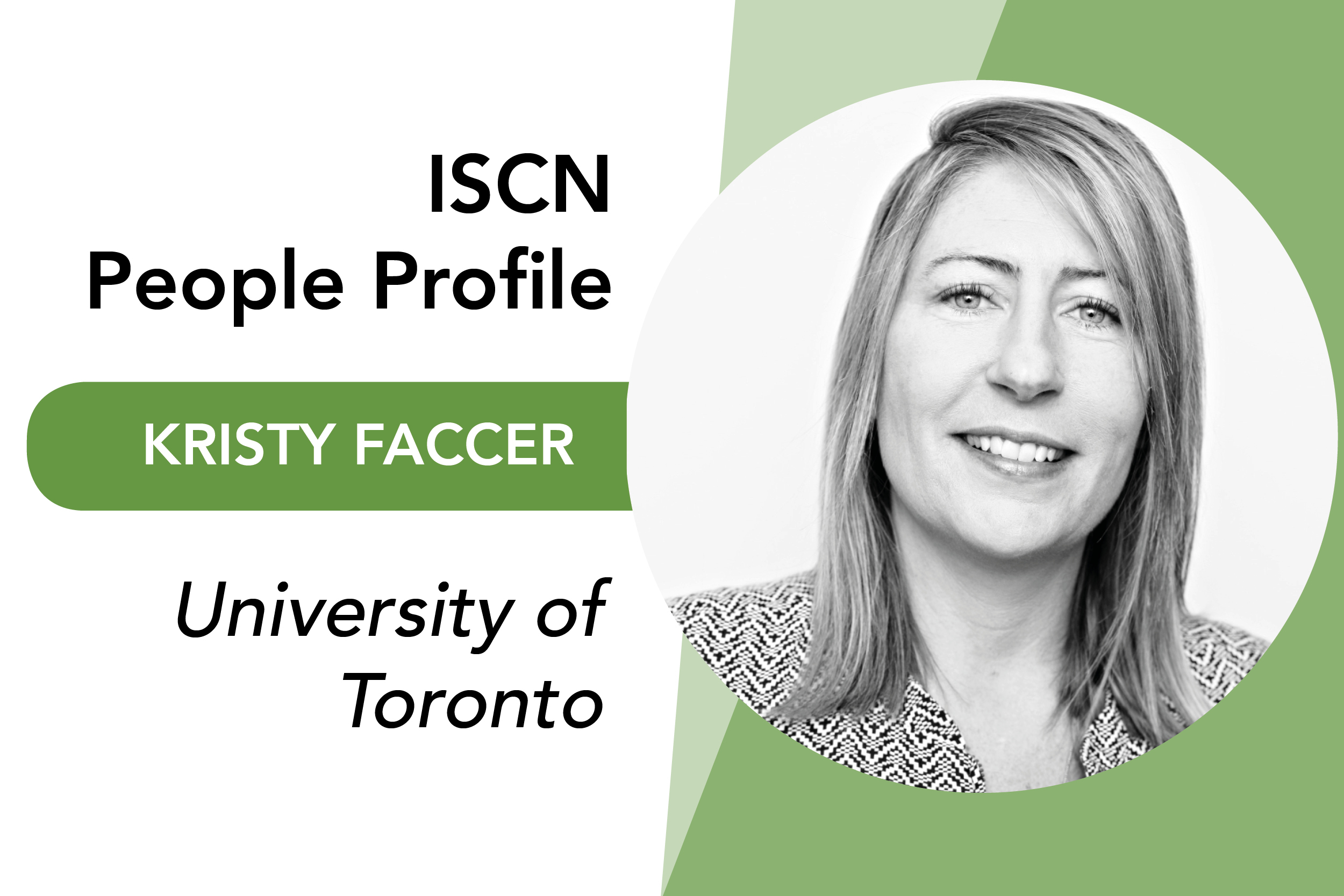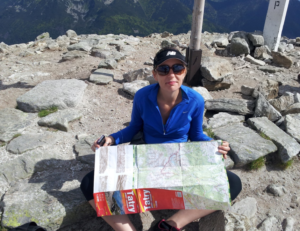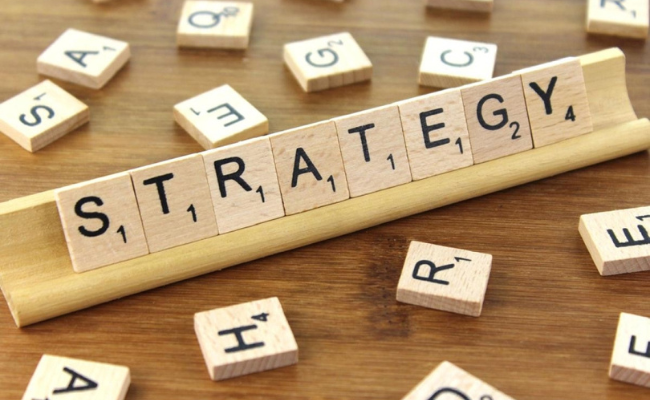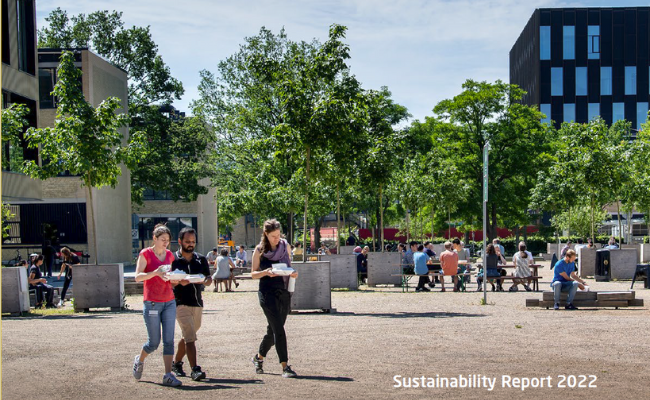Kristy Faccer
Kristy Faccer is the first Director of the University of Toronto’s Presidential Advisory Committee on Environment, Climate Change and Sustainability (CECCS).
The CECCS has the ambitious mandate of transforming how the university and its partnerships contribute to sustainability. In some ways, this position is a bit of a homecoming for me as I started my career near Toronto and recently returned to Canada after living and working internationally for many years. I enjoy exploring new places, being outside and spending time with my colorful little pugs.
Big Idea(s) for Advancing Sustainability in Higher Education
Is there one thing you know now that you wish you had realized five years ago related to your work?
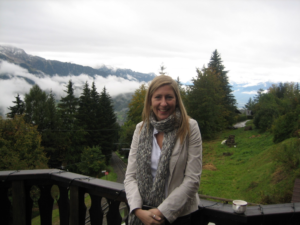 That the turn in universities towards institutional sustainability and leadership on climate could translate to ‘hybrid’ roles like the one I’m currently in. Most of my career has involved navigating the liminal waters between knowledge and action so that I could stay close to both. More and more, I find that universities are investing in people, partnerships and processes that benefit from experience in both research and practice, including on issues like climate change and sustainability. This is a promising development for universities and for their students who are looking for meaningful jobs that don’t limit their future career choices.
That the turn in universities towards institutional sustainability and leadership on climate could translate to ‘hybrid’ roles like the one I’m currently in. Most of my career has involved navigating the liminal waters between knowledge and action so that I could stay close to both. More and more, I find that universities are investing in people, partnerships and processes that benefit from experience in both research and practice, including on issues like climate change and sustainability. This is a promising development for universities and for their students who are looking for meaningful jobs that don’t limit their future career choices.
Leadership and Inspiration
What does excellent leadership look like to you?
I admire leaders that listen, are open to learning, and that lift the people up around them. I appreciate leaders that express humility and humanity and that have a good sense of humor.
Tenacity and Perseverance
The Climate Emergency we face feels like the greatest challenge of our lifetime – what keeps you inspired?
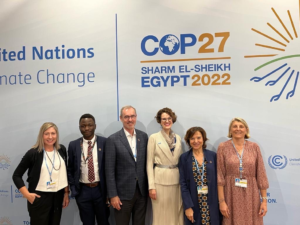 I’m inspired by the leaders and the everyday heroes that are fighting for climate at the coal face, despite so many other challenges in society and in their own lives. I’m inspired by those that chip away (and sometimes blast through!) that which seems impenetrable. I’m inspired by those that mobilize for change and find renewed motivation in examples and developments that seemed impossible at earlier points in my career.
I’m inspired by the leaders and the everyday heroes that are fighting for climate at the coal face, despite so many other challenges in society and in their own lives. I’m inspired by those that chip away (and sometimes blast through!) that which seems impenetrable. I’m inspired by those that mobilize for change and find renewed motivation in examples and developments that seemed impossible at earlier points in my career.
Fun Fact
What is a job that you have had that would surprise your colleagues?
For a few years, I worked for the International Union for Conservation of Nature (IUCN) as a Global Advisor on a project being delivered in over twenty countries and triple that number of regional business, government, and community partners around the world. My task was to work with fit-for-purpose local and global team members on what are now called nature-based solutions. The project was very much ahead of its time in connecting decision-makers to climate and biodiversity solutions that also contributed to local resilience and social and economic wellbeing. More than ten years on, I still find many of the lessons and experiences that came from that project relevant to the challenges we continue to grapple with today.
Strategic Sustainability for Change
Date: May 23, 2023
Time:
10-11:15am Eastern Standard Time (UTC-5)
Check the start time in your time zone and download a calendar link for this event.
Details: This is the final webinar based on the recently released “Bloomsbury Handbook of Sustainability in Higher Education: An Agenda for Transformational Change” edited by Wendy M. Purcell and Janet Haddock-Fraser.
The handbook shows that higher education is essential to transformative change for sustainability and delivery of the Sustainable Development Goals. Part One focuses on sustainability as a driver of change within higher education institutions (HEIs), while Part Two examines how HEIs’ sustainability agenda influences and amplifies change beyond the institution. Cases include Aruba, Belgium, Brazil, Canada, Hong Kong, Japan, Lebanon, Nepal, New Zealand, Nigeria, South Africa, Spain, Uganda, UK, and the USA.
This session will explore ways sustainability can be adopted at a strategic level using different lenses. For example, the pursuit of research and academic excellence, or an institutional focus on the betterment of community and society at large. It will highlight the importance of leadership at all levels and the time it takes to effect true transformational change in higher education fueled by sustainability.
Speakers at this session are:
- Alice Aiken, Dalhousie University, Canada
- Jim Longhurst, University of the West of England, Bristol, United Kingdom
- Harro Von Blottnitz, University of Cape Town, South Africa
- David Nwogbo, National Open University of Nigeria, Nigeria
Organised by ISCN and Professor Wendy M. Purcell PhD FRSA, Professor at Rutgers University and Affiliated Research Scientist, Harvard University.
https://sph.rutgers.edu/directory/wendy-purcell-phd-sheherhers
https://scholar.harvard.edu/wendypurcell/home
https://www.linkedin.com/in/wendy-purcell-phd-frsa-08703472/
Photo credit: Strategy by Nick Youngson CC BY-SA 3.0 Alpha Stock Images
DTU publishes its first sustainability report
Under the heading 'We develop technologies for people and sustainable change', DTU has published a report on the University's sustainability.
DTU, Technical University of Denmark, has worked with sustainability for a long time – in research as well as in day-to-day operations. But now, for the first time, DTU is publishing a report documenting climate accounts, consumption of resources and recycling, as well as the degree of socially sustainable surroundings and behavior.
The Sustainability Report 2022 is based on ESG (Environmental, Social, Governance) data, i.e. data on environmental, social, and governance issues, which together provide a status on DTU's sustainability conditions and indicate the direction of DTU's ambitions. The report describes many of the initiatives DTU has taken and will continue to take to create a sustainable university.
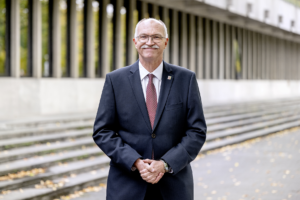
"The World is changing – and so is our perception of sustainability. At DTU, we constantly want to develop in a more sustainable direction. Sustainability is an integral part of how DTU educates engineers as well as in our research and development of new technologies. The sustainable dimension is crucial," says DTU President Anders Bjarklev.
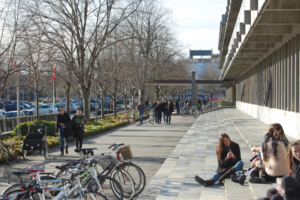
Good start, but we need to go further
The report is based on a review of relevant data, policies, and focus areas with a focus on operational data in the green area, environment data, as well as initiatives within good business conduct and integrity. The report is a snapshot of the current situation, but also sets the direction for the coming years.
Research and development of world-class technology is resource-intensive, as the University relies on laboratories and research infrastructure that consume energy and raw materials. But this does not mean that the University does not have ambitions to reduce resource consumption and create socially sustainable surroundings and behavior.
"At DTU, we believe that openness and transparency are important. This is especially true in work with sustainability. Both students and staff are aware of their habits and want to act sustainably. Therefore, we also try to create a physical environment that allows everyone on campus to minimize their own use of resources. It is a work we have started, but we can go much further," says Anders Bjarklev.
Read more in the report: https://www.dtu.dk/english/about/strategy-policy/sustainability-report
